All she knew was that there was some kind of red-alert ''mass tragedy'' occurring.
Memories of the 2004 tsunami would have swirled through her head.
Today, with the chlorine gas incident that put 37 people into the hospital's emergency ward for treatment behind her, Nurse Jenny could take it easy.
''I was quite busy yesterday,'' said real-name Hathairat Rangsansarit, whose job is liaison officer and registered nurse at the hospital.
She's the first person that people on Phuket call in any emergency on Phuket's popular holiday west coast.
This was a first of its kind problem, too. Exposure to the chemical chlorine was a new one for Nurse Jenny, but Phuket's doctors and nurses are prepared for anything.
''The first thing we had to do was decontaminate everybody by putting them into showers,'' she said. ''Otherwise others could be affected.
''Those who were struggling to breathe were given oxgen and medication straight away.
''As this was happening, the 'cascade' call system was bringing in people to help. Usually the Emergency Ward only has five or six staff.
''But people did what they were trained to do, and quickly called others in their networks.
''Before long, we had 50 doctors and nurses treating the 37 chlorine-affected people. Most of them suffered irritated skin and inflamed nasal passages.
''The alert began about 10.30 when the first cars from Phuket Orchid Resort and Spa and Karon council began bringing in distressed people. Two hours on, it was all over.''
By a stroke of good fortune, Nurse Jenny had returned late the previous night from a seminar on disaster planning in another province.
Many Phuket hospitals were called on to help yesterday, with the Phuket disaster plan calling for ''respiratory triage'' at Patong Hospital, closest to the incident and first to respond, then distribution of patients to other hospitals for further treatment.
Phuketwan watched Nurse Jenny directing the action yesterday and supervising a list of names placed on an outside wall.
The years rolled back to December 26, 2004, when the tsunami struck Phuket and the Andaman coast. Nurse Jenny, then the hospital's midwife, delighted in delivering babies and had never seen a dead body.
Within the space of a few days, she had identified, bagged and labelled 153 tragic victims, while also helping to cope with scores of injured at the 60-bed hospital.
She did such a great job in the week after the tsunami that she won a national Rotary award, a boost to her confidence that enabled her to apply for and win an exchange scholarship to Seattle and Vancouver.
Today she is an integral cog in a fairly well-oiled disaster planning system that deservedly reassures residents and tourists that Phuket's hospitals can cope with earthquakes, landslips, tsunamis, bus crashes, chlorine gassings . . .
. . . not that anyone wants to think about these things too much.
Being prepared, though, is reassuring. Last August, an exceptional flash flood sent water over the Patong Hospital's perimeter walls and the basement generator went under.
As a result, the most serious patients had to be evacuated to Phuket's other hospitals. Nurse Jenny says that the Public Health department has invested 15 million baht to lift the height of the perimeter walls, so it doesn't happen again.
''The doctors and nurses did a great job yesterday and we know we have to be constantly prepared,'' she said. And just so more staff can talk to most tourists, many are now having daily English language tuition.
In any language, having a Nurse Jenny on hand is a real asset when there's trouble.

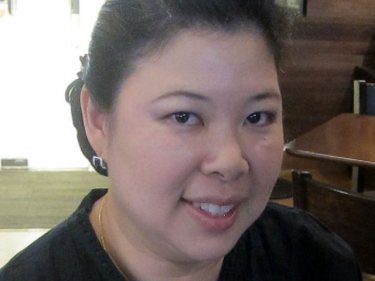


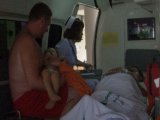
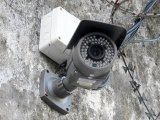

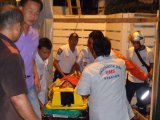


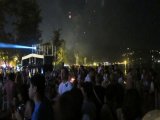






nurse? should be minister for hospitals on phuket what a credit to phuket and thailand jenny is.
Posted by traveller on February 19, 2012 21:14